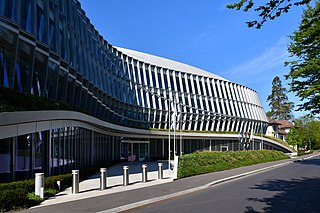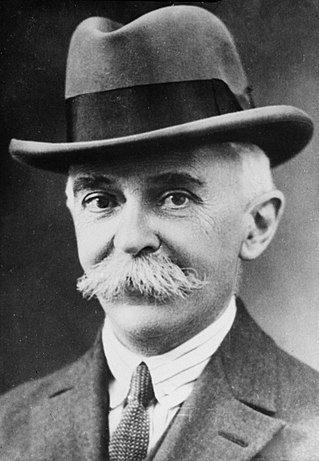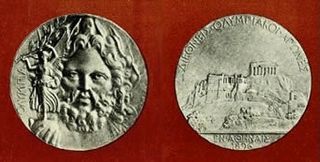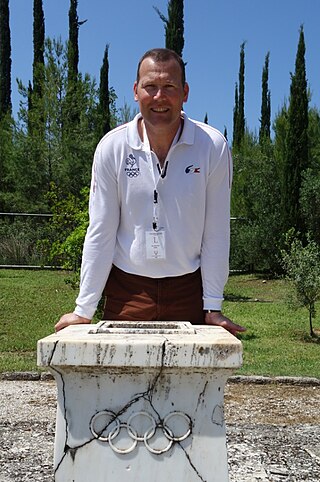
The International Olympic Committee is a non-governmental sports organization based in Lausanne, Switzerland.

The modern Olympic Games are the leading international sporting events featuring summer and winter sports competitions in which thousands of athletes from around the world participate in a variety of competitions. The Olympic Games are considered the world's foremost sports competition with more than 200 teams, representing sovereign states and territories, participating. By default, the Games generally substitute for any world championships during the year in which they take place. The Olympic Games are held every four years. Since 1994, they have alternated between the Summer and Winter Olympics every two years during the four-year Olympiad.

Charles Pierre de Frédy, Baron de Coubertin, also known as Pierre de Coubertin and Baron de Coubertin, was a French educator and historian, co-founder of the International Olympic Committee, and its second president. He is known as the father of the modern Olympic Games. He was particularly active in promoting the introduction of sport in French schools.

The Summer Olympic Games, also known as the Games of the Olympiad, is a major international multi-sport event normally held once every four years. The inaugural Games took place in 1896 in Athens, Greece, and the current Games are being held in 2024 in Paris, France. This was the first international multi-sport event of its kind, organized by the International Olympic Committee (IOC) founded by Pierre de Coubertin. The tradition of awarding medals began in 1904; in each Olympic event, gold medals are awarded for first place, silver medals for second place, and bronze medals for third place. The Winter Olympic Games were created out of the success of the Summer Olympic Games, which are regarded as the largest and most prestigious multi-sport international event in the world.

The 1896 Summer Olympics, officially known as the Games of the I Olympiad and commonly known as Athens 1896, were the first international Olympic Games held in modern history. Organised by the International Olympic Committee (IOC), which had been created by French aristocrat Pierre de Coubertin, the event was held in Athens, Greece, from 6 to 15 April 1896.
The Olympic Oath is a solemn promise made by one athlete, judge or official, and one coach at the Opening Ceremony of each Olympic Games. Each oath taker is from the host nation and takes the oath on behalf of all athletes, officials, or coaches at the Games. The athletes' oath was first introduced for the 1920 Summer Olympic Games, with oaths for the officials and coaches added in 1972 and 2010. The oath is usually said in the language of the nation which is hosting the games; however, in 1994 both the athletes' and officials' oaths were said in English. Until the 1984 games the oath takers swore upon their nation's flag; since then all have taken the oath whilst holding the Olympic Flag. All three of the oaths were combined into one beginning at the 2018 Winter Games.

The 1900 Summer Olympics, today officially known as the Games of the II Olympiad and also known as Paris 1900, were an international multi-sport event that took place in Paris, France, from 14 May to 28 October 1900. No opening or closing ceremonies were held.

An Olympic medal is awarded to successful competitors at one of the Olympic Games. There are three classes of medal to be won: gold, silver, and bronze, awarded to first, second, and third place, respectively. The granting of awards is laid out in detail in the Olympic protocols.

The International Olympic Committee (IOC) uses icons, flags, and symbols to elevate the Olympic Games. These symbols include those commonly used during Olympic competitions such as the flame, fanfare, and theme and those used throughout the years, such as the Olympic flag.
The 1900 Summer Olympics were held in Paris, France, from May 14 to October 28, 1900, as part of the 1900 World's Fair.

National Olympic Committees that wish to host an Olympic Games select cities within their territories to put forth bids for the Olympic Games. The staging of the Paralympic Games is automatically included in the bid. Since the creation of the International Olympic Committee (IOC) in 1894, which successfully appropriated the name of the Ancient Greek Olympics to create a modern sporting event, interested cities have rivaled for selection as host of the Summer or Winter Olympic Games. 51 different cities have been chosen to host the modern Olympics: three in Eastern Europe, five in East Asia, one in South America, three in Oceania, nine in North America and all the others in Western Europe. No Central American, African, Central Asian, Middle Eastern, South Asian, or Southeast Asian city has ever been chosen to host an Olympics.
Art competitions formed part of the modern Olympic Games during its early years, from 1912 to 1948. The competitions were part of the original intention of the Olympic Movement's founder, Pierre de Frédy, Baron de Coubertin. Medals were awarded for works of art inspired by sport, divided into five categories: architecture, literature, music, painting, and sculpture.
Raymond Gafner was an ice hockey player, referee, and a member of the IOC between 1969 and 1990.

The Cyprus Olympic Committee is National Olympic Committee representing the Republic of Cyprus. It is responsible for promoting the Olympic ideals on the island and for ensuring that Cyprus is represented with athletes at the Olympic Games and other multi-sport events.

The Olympic Games ceremonies of the ancient Olympic Games were an integral part of the games; modern Olympic Games have opening, closing, and medal ceremonies. Some of the elements of the modern ceremonies date back to the ancient games from which the modern Olympics draw their ancestry. An example of this is the prominence of Greece in both the opening and closing ceremonies. During the 2004 Summer Olympics, the medal winners received a crown of olive branches, which was a direct reference to the ancient games, in which the victor's prize was an olive wreath. The various elements of ceremonies are mandated by the Olympic Charter, and cannot be changed by the host nation. Host nations are required to seek the approval of the International Olympic Committee (IOC) for ceremony elements, including the artistic portions of the opening and closing ceremonies.

The International Fair Play Committee, abbreviated as the CIFP, is a not for profit international non-governmental organisation which serves to foster sportsmanship in international competition. It presents awards annually at the World Fair Play Awards to recognise acts of fair play carried out by sportspeople or teams. The awards ceremony is held in France and has been broadcast on television in Europe.

An Olympic diploma is a paper certificate awarded to the top eight finishers in competitions at the Olympic Games.

The Ghana Olympic Committee (GOC), formally known as Gold Coast Olympics Committee was established in 1950 and recognized the following year by International Olympic Committee. The Ghana Olympic Committee is committed to developing, organizing, and protecting Olympism or the Olympic Movement throughout the country. And ever since participating in the Summer Olympic Games in 1952 and the Commonwealth Games in 1954, during the Gold Coast period, the organization has been responsive to promoting the ideals of both Games, with respect to the ordinances set fourth by the Olympic Charter as well as the constitution of the CGF.

Éric Monnin is a French sports historian and sociologist, specializing in the International Olympic Movement. He holds a senior secondary school teaching degree in Physical Education and Sports. He graduated with a PhD in sociology and is a lecturer accredited to conduct research at the University of Franche-Comté. He is a member of the Culture, Sport, Health, Society (C3S) laboratory at the University of Franche-Comté.
George Hirthler is an American writer. He is best known for writing the novel The Idealist, which earned him the Pierre de Coubertin medal from the International Olympic Committee.













